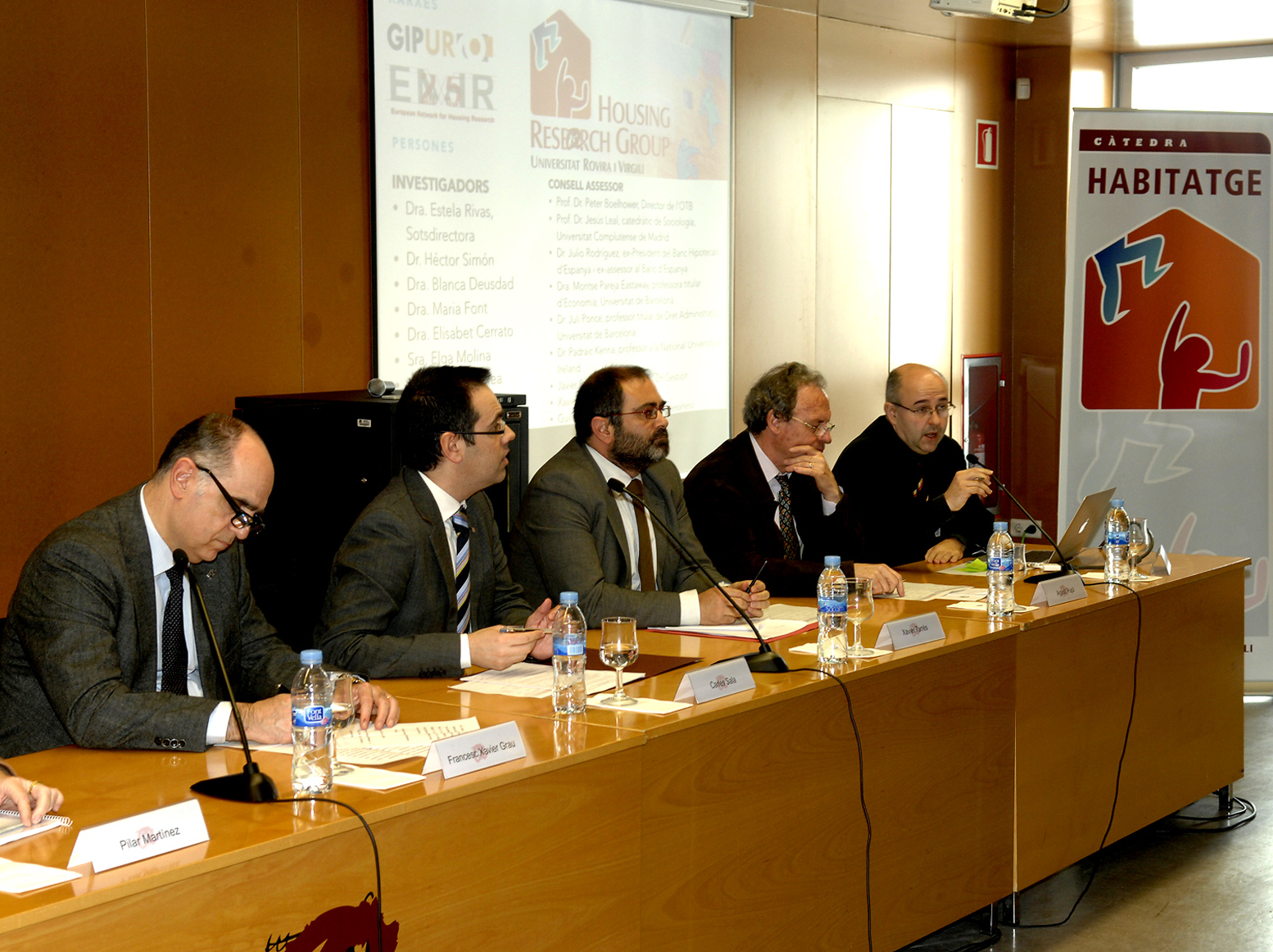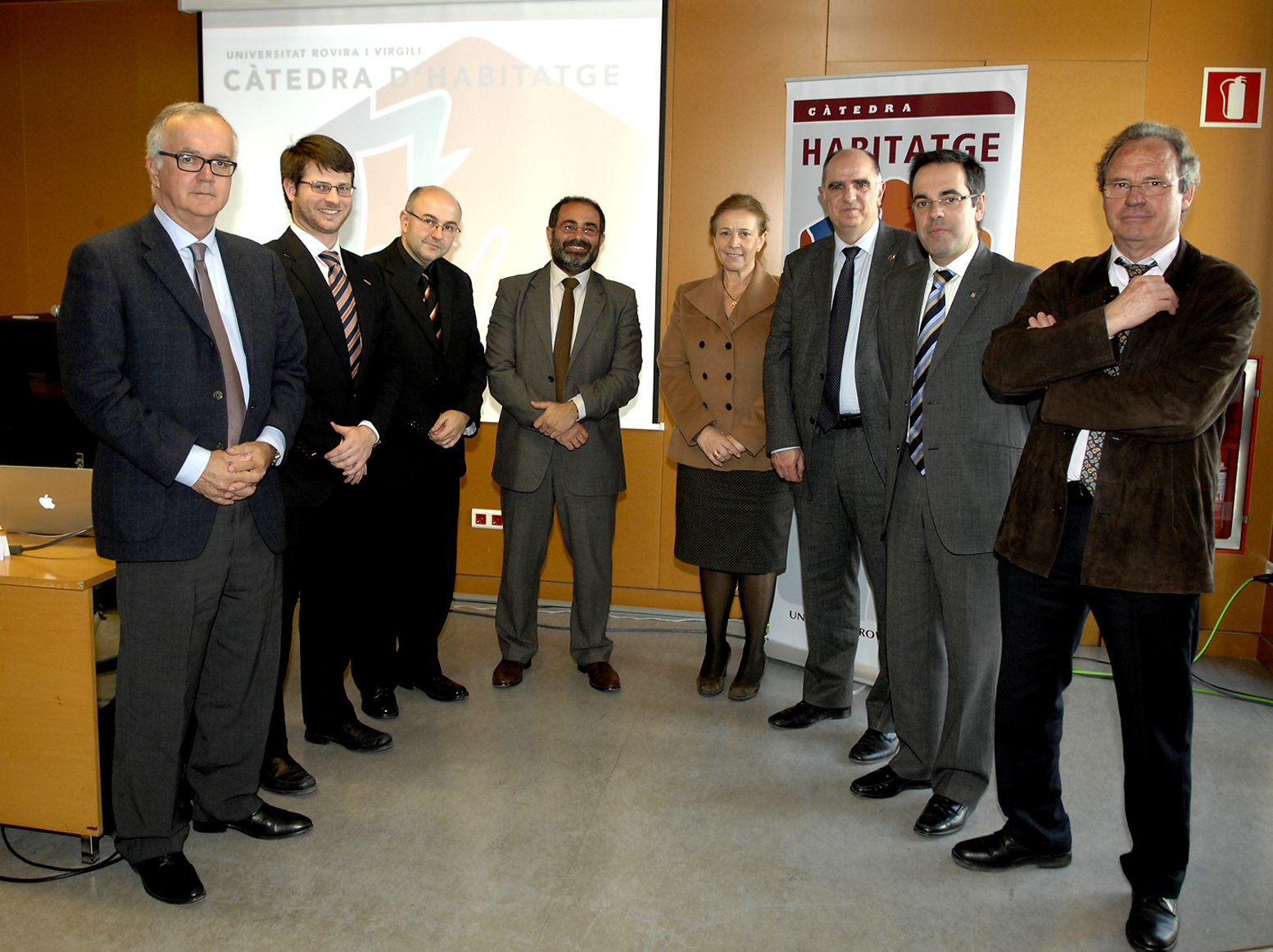About us
The UNESCO Housing Chair of Rovira i Virgili University was created by the University’s Governing Council on the 11th of July 2013. It is the result of the research and projects on housing that the legal area had been working on since 1996 and which were backed by the Research Group on Access to Housing. The Chair’s objective is to establish a stable platform for research, teaching and the transfer of knowledge on housing from an inter-disciplinary and international point of view. It is the first UNESCO Housing Chair in the world.
 The worldwide economic crisis of 2007 has highlighted the importance of housing for both the economy and people. Housing is, in fact, the only good that is both an important financial asset and a human right.
The worldwide economic crisis of 2007 has highlighted the importance of housing for both the economy and people. Housing is, in fact, the only good that is both an important financial asset and a human right.
Therefore, we organize our research in four pillars: housing as a human right, access to housing, management and organization of housing and housing as a financial asset. Our work has won the ICREA Academy Award 2016-2020.
The social impact of the research
in housing seeks to facilitate access to housing for families and prevent their loss. The evidence to date of its social impact is the contribution in the development of five housing laws, thus impacting 47 million people.
Aims
The UNESCO URV Housing Chair develops mainly three tasks: research, teaching and transfer of knowledge.
In relation to research, the lines developed by the Chair, through the Housing Research Group (HRG), cover all issues related to housing from an interdisciplinary and international point of view. The Chair’ lines of research are funded with national and international level research projects.
In terms of teaching, the Chair guarantees a specialized teaching, based on research, and aimed both at professionals in the real estate market and housing, as well as civil servants and policy makers as well as citizens in general.
As for the transfer, we want to bring the results of our research in society and that this perceives it as a return to improve access to housing of families.
Paying special attention to the social impact of our work, we want to generate a real improvement in society in everything related to housing.
Activity in the period 1996-2018
Foundational goals
_______
1) First of all, to encourage research projects dealing with housing matters at a local, national and international level. This first phase in the creation of the Chair focuses on two main areas that cover the two extremes of what we consider housing to entail: housing as a fundamental right and housing as a financial asset. Thus, we have:
a) It is in their home that people feel free to express themselves and thrive both as individuals and as families, in other words: the home is a place that guarantees the free development of a person’s personality. This currently raises several challenges, such as the following:
- Social housing available to rent, that is: how to manage public housing in the most efficient manner possible, making it possible for citizens with scant financial resources to have decent and adequate housing. The reality shows us that the stock of public housing is insufficient to meet society’s needs, making it vital to professionalise the management of this housing and make access to it viable.
- It is important to examine ways to optimise real estate possession at the current time, meaning, for example, ownership, horizontal property, renting, time sharing of holiday homes, housing cooperatives, freeholds and long term leases. In this regard, the model of a cooperative created by the organisation Sostre Civic has been a new model of social innovation for the provision of housing
- The identification of new formulas for innovation in housing possession, in other words, new categories of real estate possession, such as temporary ownership and shared ownership, which Catalonian legislators intend to regulate as alternative ways to gain access to housing, with the aim of finding an outlet for the 3.5 million empty homes currently on the market.
b) As for housing as an investment and consumer good, the main points of interest in this regard are:
- In general terms, the financing of home ownership using mortgages. Within the scope of this issue we could include an analysis of asset and liability operations in the mortgage market, in other words, aspects like the flexibility, security and efficiency of a mortgage as a real right guaranteeing home ownership, as well as the use of home loans as a refinancing mechanism in the financial system.
- Information and protection in the buying, selling and rental of homes. This is something that is related to the rights of consumers and users, which generally generate the obligation to provide precontractual information on the part of the business. In this regard, the Research Group on Access to Housing of Rovira i Virgili University drafted the basic text of the Bill currently being discussed by the Parliament, the main objective of which is to amend the Consumer Code and protect consumers in the best way possible.
- Civil liability in building construction.
- Works contracts.
- Assignment of property for future building construction.
- New works statements and works permits.
2) Secondly, the Housing Chair will carry out educational and training activities (courses, seminars, URV Foundation (FURV) activities, etc.), in other words, activities that will contribute to improving the training of business and finance professionals in this part of Europe whose work involves housing.
3) Thirdly, the intention is to carry out activities that will involve the transfer of know-how and scientific knowledge, at a local, national and international level, and between both private and public institutions. In fact, Spain, unlike other countries (such as the Netherlands and the United Kingdom), has no tradition of any real inter-disciplinary study of housing issues: there are no undergraduate courses on the matter and but few postgraduate ones (all of them sector-based: architecture, law, administration, etc.); there is also only one university chair on the subject (in Zaragoza). Thus, ours is the first chair on housing in Catalonia and only the second in all of Spain (in fact, the URV chair is the first whose vocation goes beyond the local sphere).
Prior research (2010-2013)
Below are some examples of the scientifically oriented activities of the Research Group on Access to Housing prior to the creation of this Chair, staring in 2010.
a) International and national publications
– In international journals: European Journal of Property Law; European Review of Private Law; Silesian Journal of Legal Studies, International Journal of Land Law and Agricultural Science (GIPUR), Legal affairs and dispute resolution in engineering and construction (USA)
– Books and chapters in books: El acceso a al vivienda en un contexto de crisis (2011); La optimización de la hipoteca española desde la perspectiva europea (2011); The future of European property law (2012).
– Relevant Spanish Journals: Revista Crítica de Derecho Inmobiliario, Diario la Ley, Anuario de Derecho Civil.
b) Organisation of and attendance at scientific events
- III International Housing Conference (Tarragona, May 2010). Book: El acceso a la vivienda en un contexto de crisis (EDISOFER, 2011)
- Joint organisation of an International Workshop on some legal aspects of housing in Granada (March 2011)
- Joint organisation of a Seminar on Access to Housing in Valladolid (2012)
- Organisation of the 25th Conference on the European Network for Housing Research: overcoming the crisis: integrating the urban environment, from the 19th to the 22nd of June 2013. The organisers received 480 communications from over 40 countries. The plenary sessions held dealt with such relevant issues as the housing crisis in Europe, new types of property possession, the integration of existing housing and proposals for new regulatory approaches to overcome the crisis. The conference also saw the organisation of 27 Workshops and a monograph on the current housing crisis in Spain. It was widely covered in the news media, as we can see at http://bit.ly/14taOqT.
- Attendance at national and international conferences (for example, Contemporary Housing Issues in a Changing Europe, Galway, 2012; and previous ENHR conferences, Lillehammer 2012, Toulouse 2011…).
c) Participation in legislative proposals
- Preliminary project to amend Catalonia’s Consumer Code – 2011-2013
- Bill on consumer protection in mortgage matters – 2011
- Participation in the Roundtable on Renting for the Reform of the Law of Urban Leases (LAU) – 2012
- Discussion Group on the State Housing Plan of the Ministry of Public Works 2011-2012
- Catalonian Codification Committee (intermediate property possession) – 2012
d) Relevant training and the transfer of know-how
- Drafting of Rulings (Reus City Council; Barcelona Government Delegation…)
- Directing and teaching the Masters of Mediation and Conflict Management (URV Foundation, 2012-2014)
- Participation in the URV Science Week (2010 and 2011)
- Organisation of the Course for Property Administrators and Real Estate Agents (URV Foundation, 2011 and 2013)
- Scientific conferences at private and public Institutions
e) Participation in Research Projects
- Mobility of Researchers (MCINN, 2009 and 2010)
- Department of Justice of the Generalitat de Catalunya [Catalonia Autonomous Government] (2010)
- AGAUR-Generalitat de Catalunya (PBR 2011)
- Department of Housing-Generalitat de Catalunya (2011-2013)
- 7th EU Framework Programme – Partner in the European Property Rental Group TENLAW – Tenancy law and housing policy in multi-level Europe (2012-2016)
- “Intermediate Property Possession” project MEYC (2013-2015)
f) Requested projects
- Mediation Module – Jean Monnet (2013-2016, pending resolution)
- Other projects at a national level
g) Relationship with other Research Groups
- GIPUR
- Eurohipoteca
- RUNDER TISCH (VdP, www.pfandbrief.de)
- COMMON CORE OF EUROPEAN PRIVATE LAW (www.common-core.org)








